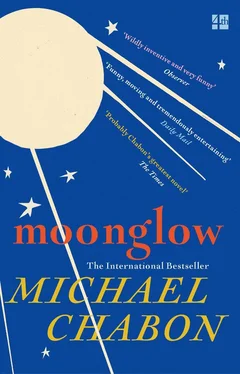1 ...8 9 10 12 13 14 ...24 “Honey,” he pleaded. “I just spent a week in jail. I’m filthy, I’m half dead, I’m in a bus station in Paterson. Please. Come get me.”
“You have eaten something?”
“I had a donut. How is she?”
“She is at school.”
He had not asked for my mother’s whereabouts. They could be inferred from the time of day and the day of the week. But he let it pass. His question had been as pointless as any other.
“And this donut you ate,” she said. “How big it was?”
“How big? It was a donut. It was donut-size. Darling—”
“But it filled up your stomach?”
“Sure.”
“Good,” she said just before she hung up on him. “Then you will have energy for the long walk home.”
He pleaded with a soldier bound for Trenton on leave and wasted the dime on another call home. My grandmother had taken the phone off the hook. For the soldier’s benefit he pretended, while listening to the busy signal, to hold a brief conversation with his wife in which he was forgiven and redeemed. He coughed to cover the clatter as the phone returned the dime, which paid for the bus to Ho-Ho-Kus. It dropped him on Sheridan Avenue.
He walked surrounded, for a long time, by tracts of new construction. Dirt lawns, planted saplings, houses like boxcars in snaking lines. When he drove past these new housing tracts at forty-five miles per hour on his way to work every day, they had appeared harmless, contained. On foot he could not seem to get past them. Houses oozed without limit in every direction. Cornfields, orchards, stands of oak and hickory that had seemed untouchable by time or steel had all been dragged under. My grandfather felt a stirring of unease that grew stronger the nearer to home he came. He worried that, in his absence, the ooze would have spread to overtop their white house on its little green hill.
He shook off the thought. He was irritated with himself for thinking it. But as he threaded his way among the housing developments, the image returned to plague him: his house, his wife and daughter, driven beneath the ooze. At last he turned off the county road onto a road paved with gravel and found himself safely among apple trees and shoots of corn. The panic subsided. But he could not seem to reassure himself that his family would not be drowned.
* * *
The way I heard the story was that sometime after the fall of France my grandmother, unwed, not yet eighteen, and pregnant with my mother, had been taken in by Carmelite nuns in the countryside outside of Lille, where her family were prominent Jewish dealers in horses and hides. On learning that she was pregnant, and with the bastard of a Catholic—unappeased by knowing that the father was a handsome young doctor—her family had disowned her. It was the family of the handsome young doctor who had arranged things with the nuns. Shortly after my mother’s birth, my grandmother’s family was deported to Auschwitz, where they perished. After the handsome young doctor had treated the injuries of some local members of the Resistance, the SS had shot him.
All her life my grandmother’s family looked askance at her interest in drama, poetry, handicraft. The nuns, by contrast, were sympathetic, aesthetic. They supported themselves by making and selling fragrant wreaths of laurel and dried flowers. They tended orchards and beehives and a meadow dotted with sheep. When I was eight or nine my mother had explained the concept of survivor’s guilt to me, and told me that in her mother’s case this was one of its sources: She had never been happier than with the sisters of the Lille Carmel.
My grandparents’ farmhouse, on eleven acres outside Ho-Ho-Kus, New Jersey, had neither nuns nor sheep. But there was a meadow and an apple orchard, and my grandfather had spent their first winter building hives and honeycomb frames according to plans in a book from the public library. He had taken out a lease on the property in anticipation of my grandmother’s discharge from her first hospitalization, from late 1952 to late 1954. He had hoped the place might carry her back to the remembered sweetness of the Carmel.
The apples had proved stony. The special-order French bees were prey to wanderlust and ennui. But from her first sight of the farmhouse, with its gingerbread, tangle of roses, and fresh coat of whitewash, my grandmother had conceded to my grandfather’s logic. She emerged from that first time at Greystone in a fragile and quiet state, holding herself like an egg balanced on a spoon, but for the next twenty-eight months they lived on the farm in relative contentment. No angel inspired her to bare the prophecies of her body to fellow passengers on buses or trolley cars. She abandoned the bouts of prolonged fasting that rendered her skin translucent to an inner light equivalent in her mind to the Christ of her guardian nuns. She found work, taking leads in three productions at the prestigious Paper Mill Playhouse and being cast in a small role in a Broadway revival of Ah! Wilderness that closed out of town. Until the spring of 1957 the Skinless Horse had kept its gibes and railleries to itself.
Sometime during the week preceding my grandfather’s rampage at Feathercombs, Inc., her cruel familiar returned to take up residence in a grand hickory tree in the house’s front yard. The precise moment of its reappearance, like the reason thereof, remained unclear to my grandfather. In hindsight he recalled my grandmother once or twice having held herself very still, eyes closed, as if fighting down a bout of nausea. He remembered a shudder that she repressed, a smile that hung too long from the hooks of her face. For all my grandfather knew, the Skinless Horse might have been hanging around for months before it decided to occupy the tree fort my grandfather had built in the hickory tree as a thirteenth birthday present for my mother.
The day he got out of jail the first thing he saw, coming down the hill from the main road, was the tree. It was a sixty-footer, planted well before the turn of the century by the house’s original occupants, a fellowship of free-love Christians. At the height of summer it would spread its leaves across the sky like a child’s drawing of a tree, a perfect circle of crayon green. Hidden among its branches, the tree fort was my mother’s galleon and keep. Now at the base of the tree there was a burnt blotch from which four jagged streaks extended upward. It looked like the print of a giant paw.
The eyeholes of the tree fort stared down at my grandfather as he circled around to the kitchen at the back of the farmhouse. They never used the front door. My grandfather hauled himself up the last three steps of his long walk home onto the back porch. The boards under his wing tips were new last summer. The previous porch was rotten and colonized by insects, and my grandfather had demolished it with a ferocity that approximated hope. Working alone or with my mother passing him nails from a bucket or bracing a plank with her bottom, he had cut, framed, and whitewashed the lumber of the new one, carpentering its Gothic lace under the guidance of another library book. The new porch felt sound and solid under the weight of him. Like the rest of the house, it was not and would never be his property, but in those years his ambition was not to own a piece of the world. Just to keep that piece from falling down or burning up around him would suffice.
The spring afternoon had turned cool, but the back door was open. My grandfather smelled onions, bay leaf, simmering wine. He heard the “Trout” quintet bubbling on the record player in the living room. The kitchen windows streamed with vapor. Behind them darted the shape of my grandmother. She was an excellent cook, never more calm or present than with her hand on the rosewood grip of a razor-sharp Sabatier. In the early fifties, before her first hospitalization, she had been a frequent guest on WAAM’s Home Cooking , giving lessons in French cooking to Baltimore housewives (those with televisions, at any rate) and briefly the host of her own program, La Cuisine , which aired two mornings a week. *
Читать дальше












